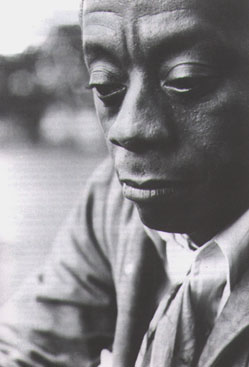|
|

by James
Baldwin
The first line written in The
Amen Comer is now Margaret's line in the Third Act: 'It's an
awful thing to think about, the way love never dies!' That
line, of course, says a great deal about me - but I was
thinking not only, not merely, about their terrifying
desolation of my private life but about the great burdens
carried by my father. I was old enough by now, at last, to
recognize the nature of the dues he had aid, old enough to
wonder if I could possibly have paid them, old enough, at
last, at last, to know that I had loved him and had wanted
him to love me. I could see that the nature of the battle we
had fought had been dictated by the fact that our
temperaments were so fatally the same: neither of us could
bend. And when I began to think about what had happened to
him, I began to see why he was so terrified of what was
surely going to happen to me.
The Amen Corner comes somewhere
out of that. For to think about my father meant that I had
also to think about my mother and the stratagems she was
forced to use to save her children from the destruction
awaiting them just outside her door. It is because I know
what Sister Margaret goes through, and what her male child
is menaced by, that I became so unmanageable when people ask
me to confirm their hope that there has been progress - what
a word! - in white-black relations. there has certainly not
been enough progress to solve Sister Margaret's dilemma: how
to treat her husband and her son as men and at the same time
to protect them from the bloody consequences of trying to be
a man in this society. No one yet knows, or is in the least
prepared to speculate on, how high a bill we will yet have
to pay for what we have done to Negro men and women. She is
in the church because her society has left her no other
place to go. Her sense of reality is dictated by the
society's assumption, which also becomes her own, of her
inferiority. Her need for human affirmation, and also for
vengeance, expresses itself in her merciless piety; and her
love, which is real but which is also at he mercy of her
genuine and absolutely justifiable terror, turns her into a
tyrannical matriarch. in all of this, of course, she loses
her old self - the fiery, fast-talking little black woman
whom Luke loved. Her triumph, which is also, if I may say
so, the historical triumph of the Negro people in this
country, is that she sees this finally and accepts it, and,
although she has lost everything, also gains the keys to the
kingdom. the kingdom is love, and love is selfless, although
only the self can lead one there. She gains
herself.
One last thing: concerning my
theatrical ambitions, and my cunning or dishonesty - I was
armed, I knew, in attempting to write the play, by the fact
that I was born in the church. I knew that out of the ritual
of the church, historically speaking, comes the act of the
theatre, the communion which is the theatre. And I knew that
what I wanted to do in the theatre was to recreate moments I
remembered as a boy preacher, to involve the people, even
against their will, to shake them up, and, hopefully, to
change them. I knew that an unknown black writer could not
possibly hope to achieve this forum. I did not want to enter
the theatre on the theatre's terms, but on mine. And so I
waited. And the fact that The Amen Comer took ten years to
reach the professional stage says a great deal more about
the American theatre than it says about this author. The
American Negro really is a part of this country, and on the
day we face this fact, and not before that day, we will
become a nation and possibly a great one.
Circa 1954
|
